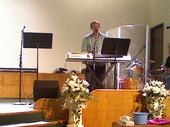FORGIVENESS
The practice of forgiveness is not simply a one-time action or an isolated feeling or thought. Forgiveness involves us in a whole way of life that is shaped by an ever-deepening friendship with God and with other people. The central goal of this practice is to reconcile, to restore communion - with God, with one another, and with the whole creation.
L. Gregory Jones writes, "Forgiveness works through our ongoing willingness to give up certain claims against one another, to give the truth when we access our relationships with one another, and to give gifts of ourselves by making innovative gestures that offer a future not bound by the past."
A Whole Way of Life
Almost all of us yearn for resolution to unresolved conflicts. Incidences of horrifying evil make us wonder how forgiveness can make a difference. It even takes courage to forgive in smaller, day-to-day conflicts. What do you remember of situations where forgiveness did not happen? How does your experience color your notion of forgiveness in general?
Even if we understand forgiveness as the right response, what if we don't really want it? How can we pray with integrity, "Forgive us our sins, as we forgive those who sin against us?" What difference do you suppose it makes if the goal of forgiveness is restoring communion rather than dealing with guilt?
Facing the Obstacles to Forgiveness
Forgiveness does not merely refer backward to the absolution of guilt; it also looks forward to the restoration of community. What part might forgiveness play in breaking cycles of violence and abuse in our families and our communities? How do we explain our fascination with violence and hatred in the media?
Part of the problem of wanting to practice forgiveness is that we are often less sure of what we love than of what we hate. When have you noticed someone retaliating by choosing self-destruction over reconciliation?
Anger is a sign that something needs to change!!
